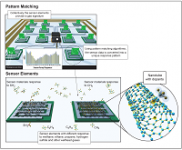System of Printed Hybrid Intelligent Nano-Chemical Sensors (SPHINCS)

Technology Description:
Palo Alto Research Center (PARC) will work with BP and NASA’s Ames Research Center to combine Xerox’s low-cost print manufacturing and NASA’s gas-sensing technologies to develop printable sensing arrays that will be integrated into a cost-effective, highly sensitive methane detection system. The system will be based on sensor array foils containing multiple printed carbon nanotube (CNT) sensors and supporting electronics. Each sensor element will be modified with dopants, coatings, or nanoparticles such that it responds differently to different gases. Through principal component analysis and machine learning techniques, the system will be trained for high sensitivity and selectivity for components of natural gas and interfering compounds. The goal is to be able to detect methane emissions with a sensitivity of 1 ppm and localize the source of emissions to within 1 meter, offering enhanced precision when compared to current equipment. By using low-cost printing techniques, the project team’s system could offer an affordable alternative to more expensive optical methane detectors on the market today.
Potential Impact:
If successful, PARC’s innovation could dramatically decrease the costs of methane monitoring while strengthening the accuracy of methane emission detection.
Security:
Better methane detection technologies could improve the sustainability of domestic natural gas production and the safety of operations.
Environment:
Enhanced detection sensors could enable greater mitigation of methane leakage and lead to an overall reduction in harmful methane emissions associated with natural gas development.
Economy:
PARC’s system could significantly reduce the cost of methane monitoring to $350 annually per wellpad, which could encourage expansion of methane monitoring at the nation’s more than 480,000 producing natural gas wells.
Contact
ARPA-E Program Director:
Dr. Joseph King
Project Contact:
Dr. David Schwartz
Press and General Inquiries Email:
ARPA-E-Comms@hq.doe.gov
Project Contact Email:
David.Schwartz@parc.com
Partners
NASA Ames Research Center
Related Projects
Release Date:
04/29/2014
